New Bush team
AS President Bush prepares to announce his new policy on Wednesday evening for a war-torn Iraq he has made dramatic changes in the military and civilian teams that will be in charge of implementing it. The policy will not follow the recommendation of the Baker-Hamilton-led Iraq Study Group which advocates a phased withdrawal of US troops with Americans fighting less and concentrating more on the training of Iraq’s security forces.
He will instead buy into Senator John McCain’s recommendation that American troop levels in Iraq be substantially increased and a military outcome sought by quelling the Sunni insurgency and disarming the Shia militias. This is seen to achieve Bush’s revised goal of not “victory” nor “an Iraq that is a model of democracy” but an Iraq with a functional government largely at peace with itself.
As part of this policy, the Iraqi government will be expected to meet political “benchmarks”. These include a constitutional amendment addressing Sunni concerns, the passage of a law on the distribution of Iraq’s oil revenue giving a fair share of this to Sunni-dominated but resource-poor central Iraq and a change in current rules that forbid the employment of former Baath Party officials.
There is an expectation that Prime Minister Nuri al-Maliki will fashion a new coalition of the two main Shia parties, the Kurds and the Sunnis while excluding the party of Moqtada al-Sadr. The disarming of the Mahdi Army, held responsible for most of the sectarian killing and ethnic cleansing in Baghdad’s mixed Shia-Sunni neighbourhoods, will follow.
This will facilitate the clearing and holding of troubled Baghdad areas by American forces and the implementation of reconstruction and employment-generation programmes. For the latter two, it is speculated that Bush will ask Congress for up to one billion dollars, revamp and strengthen the provincial reconstruction teams set up by the State Department and provide additional funds to army commanders to finance the granting of contracts to Iraqis for local projects.
The last element of the new policy is apparently a renewed effort to seek a settlement of the Palestine issue for which intense preparations are being made with US Secretary of State Condoleezza Rice preparing to leave for discussions in the region soon after the president’s speech. There will, however, be no effort to involve the Syrians and Iranians since Bush and his team seem to believe that the price these two countries will demand for their cooperation will be too high.
To the Democrats now in control of Congress all this sounds like “more of the same” policies that Bush and his team have followed so far.
The surge in troops may be in accord with Bush’s oft stated goal of “victory in Iraq” but Bush will not be sending out the number of troops really needed to secure victory militarily.
Recalling the famous military advice given to President Dwight Eisenhower in the mid-1950s that holding Vietnam needed eight divisions and eight years an analyst has estimated that for military victory in Iraq the number of troops needed in Baghdad alone would come close to 200,000, a number that the heavily overextended American armed forces cannot even contemplate.
The current plan apparently calls for an increase of 20,000 or perhaps 30,000. That would not suffice particularly when the expected reinforcement expected from Iraq’s security forces is considered to be of doubtful value at least in the short term. Moreover, such surges have been tried in the past. Americans have managed to pacify neighbourhoods or regions but they have not been able to hold them for the required 18 to 24 months, believed to be the minimum period required to allow economic activity to displace insurgency and heal sectarian wounds. As a result, none of these “pacified” areas can be termed as such now.
Iraqi spokespersons have said that the benchmarks Bush will announce are those that the Iraqi government has set for itself. Critics argue that these requirements have been made known to the government for some time. The problem is that Al-Maliki has been unable to deliver and has done precious little to curb the Mahdi Army. On the contrary, in a recent display of independence he ordered the Americans to lift the blockade they had imposed in a part of Sadr City to arrest Mahdi Army units that had engaged in sectarian killings.
In Sunni eyes, Al-Maliki remains crucially dependent on support from Moqtada Al-Sadr whose party has 30 members in parliament and holds five cabinet posts. The execution of Saddam on the day when Sunnis were to celebrate Eid, the inclusion of Sadr supporters in the team presiding over the execution and terming the latter as an Eid gift for the Iraqis suggested to Sunnis that the exercise was prompted not only by a justified hatred for Saddam but also by a hatred for the sect to which he belonged.
Most importantly, Al-Maliki has shown no inclination to use his authority as head of the ruling coalition to amend the Iraqi constitution to permit equitable sharing of Iraq’s oil revenues or to do away with the provisions that would set up an autonomous Shia region in the south of the country.
Bush has made a crucial personnel change by replacing the Sunni US ambassador, Zalmay Khalilzad, who was charged by Al-Maliki’s aides as pressing too hard for a fair deal for the Sunnis, by Ryan Crocker, currently US ambassador to Pakistan. This will be seen by the Iraqi Sunnis as yet another sign that the Americans have given up trying to protect Sunni rights.
The Democratic leadership of the new Congress has already made it clear in a letter to Bush last week that it is opposed to additional deployment and is looking instead for a phased withdrawal. The Democrats have also decided to hold hearings on the Iraq policy, and from the list of experts made public so far it seems that opponents of the current Bush policy or of any marginally changed policy will dominate the hearings. The Democrats will be able to say that not only the election results but also respected foreign policy experts want a more drastic change of policy.
All this notwithstanding, it is certain that Bush will go ahead with this new policy. The Democrats, despite their control of Congress, cannot prevent Bush as the supreme commander making the executive decision to send additional troops to Iraq.
They could try and deny him the funds he needs for this purpose but this will probably be difficult to sustain politically if he makes a strong case for supporting US troops currently in Iraq and if he makes it clear that this is not an open-ended commitment.
Democrats know that the American public sees current policy as non-viable but it also knows that the public does not want a humiliating withdrawal and will buy into any policy that promises a “graceful” withdrawal if not “victory”.
There is a school of thought that advocates “cut your losses” and let the “Iraqis stew in their own juice” but many others are fair-minded enough to recall what was previously known as the Pottery Barn rule but what is now accepted as the Powell dictum for Iraq — “if you break it you own it”. The Americans have broken Iraq and must be prepared to pay a further price to clean up the mess that has been created there.
It is in this context that the personnel changes made by Bush in the last few weeks have to be seen. Perhaps the most crucial, excluding the replacement of Donald Rumsfeld by Robert Gates as defence secretary, is the appointment of Gen Petraeus as the commander of American forces in Iraq. He has impeccable credentials. One of the prime intellectuals in the American army with a Ph.D. from Princeton he spent two and a half years of the last four in Iraq and is credited with having brought peace to Mosul by resurrecting the economy, restoring services and curbing the insurgency through the judicious use of force.
It was here that posters in every barracks asked American soldiers “What have you done to win Iraqi hearts and minds today?” He has authored the new manual on counter-insurgency the leitmotif of which is that protecting the indigenous population and imposing security are the key to defeating the insurgency. He believes that some sort of stability can be brought to Iraq though one doubts that he shares Bush’s vision of victory.
Can he succeed in using military force with the same finesse that he employed in Mosul? The scene in Baghdad which will be the principal focus of attention is vastly different. Here he will be tackling a sectarian war with most of the Iraqi political and security forces ranged against him rather than with him. He will have constant interference of the wrong sort from the government and its supporters. A bleak prospect.
Zalmay Khalilzad’s replacement Ryan Crocker is the consummate professional who speaks Arabic fluently and has experience of Iraq, Afghanistan and the Middle East generally. As a professional he is acutely aware of the need for diplomacy to be conducted quietly and one can expect that he will maintain a low profile and that as of now there will be very few press releases from the American embassy in Iraq. The question is whether his quiet approach will be sufficient to help the Iraqis to bridge the sectarian divide.
More importantly, he will have to struggle with the Iraqi government’s apparent indifference to the need for giving the Sunnis a substantial stake in a united Iraq. He will labour under the disadvantage that unlike Khalilzad he has no direct relationship with or access to President Bush and to his team of political advisers.
The pressure will be great to maintain the unity of Iraq and for giving the Sunnis a role. This will come from all the American allies in the region. Will the new Bush policy be able to achieve this? One can hope but the outlook is gloomy. What may happen is what some analysts in America’s think-tanks are already talking about.
Accept that the sectarian divide is too wide to be bridged. Accept that Iraq cannot stay together. Use the American force to arrange as peaceful a transfer of population as possible and let three independent regions emerge. There can of course be no surer recipe for disaster in the region.
The writer is a former foreign secretary.
Teaching in mother tongue
NADIA is a bright and intelligent child of eight. Her mother — a housemaid — has a dream. She wants to educate her children so that they can lift themselves out of the grinding poverty that has been their parents’ lot. Happily that is what President Pervez Musharraf says he also wants. But probably, he does not have a clue as to how to go about it.
Take Nadia’s case. She attends a private school (charging a monthly fee of Rs300) near her home in a low income locality of Karachi. With her mother’s help she has learnt to read and write Urdu fluently. I talked to her about the moon and the stars and explained the concepts of tens and units – in Urdu. She understood what I told her perfectly since this is a language she is familiar with. That night she even went out in the courtyard to explore the celestial bodies.
Nadia reads her English book fluently, but without understanding a word of what she reads. Like all children she has a phenomenal memory. If the federal education minister’s new language policy is put into effect, Nadia will be denied the excitement of discovering the mysteries of the skies for she will not understand what she reads or is told by her teacher. Mathematics will become a lot of mumbo jumbo for her. But Lt Gen (retired) Javed Ashraf Qazi wants children like Nadia to be taught the natural sciences and mathematics in English. Since her mother does not know English there will be no one to help her tide over the language difficulties as is done by the mothers of thousands of children in the elite English medium schools.
It is shocking that our education planners fail to understand this simple piece of logic. They counter the demand for the mother tongue being the medium of instruction in the early years of schooling with the argument that English is the international language of the day and if we want to progress we will have to teach in English. There is no denying the importance of English. But why confuse the issue? A child can be taught in the mother tongue, especially in the formative period of his life, and he can also be taught English as a subject. In fact if this approach is adopted, English can also be taught well.
At an age when a child is grappling concurrently with knowledge, information, literacy skills and numeracy skills, is it wise to burden him with all this in a language he does not even understand? Wouldn’t it be better to let him acquire knowledge in the language he has been hearing and speaking ever since he was born?
Mercifully, there are some who still understand the significance of teaching a young child in his mother tongue. A White Paper titled Education in Pakistan prepared by a team set up by the federal education ministry under Javed Hasan Aly, a retired federal secretary, has many wise suggestions to make. It is not an official statement and is designed to debate and finalise the national education policy, which the government says is in the making.
It has suggested the establishment of a national language commission to help operationalise the policy options and cater to the development of the regional languages. It specifically recommends that the medium in the first three years of the child’s education should be the mother tongue. Where Urdu is not the mother tongue it should be taught as a subject from Class I. English should be introduced as a subject from Class-III. From Class VI the medium of instruction should be Urdu for the social sciences and English for the natural sciences and mathematics.
From the White Paper it emerges that our education planners need to show some clarity of thought. This has been missing on the language question in all the education policies formulated so far. What one cannot be sure about is whether this confusion is deliberate to evade an issue that has proved to be sensitive from day one or whether it is due to a lack of understanding of the role of language in human development. Hence many myths are perpetuated that need to be exploded.
Myth #1 If English has to be taught it must be the medium of instruction.
It is possible to have a mother tongue as the medium of instruction and teach English as a subject. Most countries all over the world do that. In this case English is taught as a second language and new techniques developed for ELT are applied.
Myth #2 Teaching in English will raise our standard of education.
It will not, because standards depend on other factors such as the quality of the teachers, textbooks, curricula and the institutions available. A poor knowledge of English will drag down the standards of the teachers and the textbooks further.
Myth #3 Proficiency in English can be developed in the students by using that language as the medium of instruction.
This is a myth. In our case it has an additional drawback. With not enough teachers proficient in English who will teach the children? It is not possible to teach thousands of teachers the English language overnight. If the policy is to make do with teachers whose knowledge of English is poor, it will never succeed in making the students proficient in English.
It seems that such a strategy is aimed at pushing the poor deeper into poverty and empowering the privileged few even further. It will ensure that the poor do not get to learn good English. In fact they will not get to learn anything at all because the essence of good learning can come only in a language they speak and understand. The White Paper speaks of an apartheid-like system in education where the disadvantaged are kept out of jobs and key positions. The introduction of English, as planned by Javed Ashraf Qazi, will marginalise them further.
The British who ruled over India understood this when they introduced a new educational policy in 1904. The policy categorically declared, “English has no place, and should have no place, in the scheme of primary education.” It further states, “As a general rule, a child should not be allowed to learn English as a language until he has made some progress in the primary stages of instruction and has received a thorough grounding in his mother tongue. It is equally important that when the teaching of English has begun, it should not be prematurely employed as the medium of instruction in other subjects.”
Endangered species
MANY years ago there was a news headline: “After failing to get re-elected as Poland’s head of state, Lech Walesa may resume his original job of welder in the Gdansk shipyard.” The report was so striking that you should not be surprised at my remembering it even after more than a quarter of a century.
The World Wildlife Fund has done wonders to excite interest among Pakistanis in the preservation of endangered animal species like the snow leopard, the Houbara Bustard and the Marco Polo sheep. I wish there was an organisation to do the same for the protection, preservation and encouragement of those types among human beings who are fast becoming extinct.
They include civilised gentleman, the votary of non-violence, the honesty zealot, tolerant of others’ beliefs, the Muslim who practises his faith without exhibition, the contented bureaucrat, the politician with principles, the non-political democrat, to name a few. The good souls are slowly but surely dying out. Nobody seems to be doing anything about it.
The trouble is that good souls are themselves incapable of self-protection and proliferation of their breed and are increasingly becoming disheartened with life. On the other hand, the bad souls or evil spirits could not care less what happens to the noble ones.
For them these angelic types are redundant in a society that is becoming more materialistic and callous day by day.
I suppose you can’t have a third type in this business who would merely be interested for academic reasons if nothing else, in preserving the fast disappearing breed as a relic of the past and as an antique. Rare animals are much luckier than these humans because they are looked after so assiduously and lovingly by some crazy people who are even willing to fight for their sake.
What motivated me to write about this subject was a long letter to the editor of a Peshawar daily captioned, “An endangered species.” This was about a gentleman of Mansehra division, a former member of the Frontier Assembly whom the readers praised as a man who stood out from the rest of his class (the class being MPAs) by his lack of greed and his unusual devotion to duty as an elected representative of the people.
It is a sad reflection of our times that on reading this
letter the journalist in me became instantly suspicious that this was a publicity effort on the part of a friend or admirer of the ex-MPA. Then I curbed this upsurge of cynicism and said to myself, “Don’t be mean. It’s just a tribute to a type that is no longer seen in the political arena. The writer is not asking for anything for the man and, probably disgusted by the prevailing immorlity and selfishness, is simply citing him as an example of old time virtues. Why not take the encomium at its face value instead of tracing hidden motives in the letter?
My initial scepticism apart, the case was really extraordinary. (I was again going to say “If it’s true.”) Here was a man who, as an MPA, actually waited for his pay and allowances, etc. to make both ends meet; a person who had apparently won the election; probably the sole MPA in the country who “did not own a car of his own and had been seen going about in an old, over-used government vehicle which was graciously allotted to him in his capacity as chairman of the district vigilance committee.”
Understandably the writer of the letter paid tribute to the voters who had elected the man. I think they deserved equal recognition, if not more, for brushing aside the material considerations that govern elections today, and for using their inherent goodness to choose a man they thought was best for them. It is a different matter that such a semi-saint and such a noble soul was not to be found in other provincial assemblies.
Reading that letter I felt like paying him a visit one day. Not so much to meet the man as to find out if his voters had been satisfied with him for securing jobs for local unemployed youth, getting welfare and development work done in the area, and informing about the genuine needs of the people to the power wielders of that time.
Or did they rue the day when they had cast their ballots in his favour? And what were the considerations that had prevented that MPA from being elected again? Unfortunately the letter writer had not thrown light on these matters. I do hope the man he had praised so much was alive and well, even if unwilling or unable to pursue politics.
Maybe there are some more such politicians in Pakistan which, on the face of it, seems highly improbable. If there are any it would be interesting to find out if they are proud of their integrity. Or are they ashamed of themselves in the current flood of grab and greed, and hypocrisy and exploitation, and keep their antediluvian views hidden from the public?
If it ever comes about, my visit should also aim at finding out if any MPA of the area today has any scruples and principles, or if all of them have been overwhelmed and bought over by the indecent wealth of the denuders of the forests in which Hazara excels.
The question is: are there any MPAs and MNAs in the
country who can protect and encourage this endangered species and ensure that more of the kind are allowed to exist, set an example and take the place of this fast diminishing breed?
Is it the ruling regime that will realise that parliamentary democracy, patterned after Westminster, cannot succeed in Pakistan unless the country’s elected representatives emulate British MPs in performance and integrity? Or will the opposition do so which claims sanctimoniously to be better than the worst? I wonder if either of the two really want the endangered species to flourish.
P.S. I forgot all about Lech Walesa with whom I began this piece. That was just to remind ourselves that in case we have a political leader who was once a welder, he will make sure to destroy all evidence of his humble beginnings.
A ‘surge’ in Iraq?
PRESIDENT BUSH is widely expected to unveil a new strategy for Iraq this week that will include a substantial increase in U.S. troops.
If he does, he will face a formidable task in convincing Congress and the public that such a “surge” makes sense. It’s well known that many senior American generals, including the outgoing commanders of American forces in Iraq and the Middle East, have resisted a troop increase.
The Iraqi government of Nouri al-Maliki appears, at best, lukewarm. Mr. Maliki’s own plan, like that of the Iraq Study Group, calls for Iraqi forces to take over most of the fighting in the coming months.
A majority of the new Congress, and most Americans, favor a winding down of the U.S. troop commitment, not an escalation. Mr. Bush’s first challenge if he proposes a surge will consequently be to convince the country that the fresh troops would have a vital and achievable mission.
Those who have been arguing for the move — notably, Sens. John McCain (R-Ariz.) and Joseph I. Lieberman (I-Conn.) — say the purpose would be to pacify those sectors of Baghdad where sectarian fighting has been most intense.
They argue that the main U.S. goal in Iraq, which is to forge a
stable and sustainable government, can’t be achieved unless there is a minimal level of security in the capital.
The Iraqi army isn’t yet able to impose order, they say; if the United States doesn’t do it, the sectarian warfare will continue to escalate. Without a surge, Mr. McCain and Mr. Lieberman warn, the war will be lost.
This is a serious argument, and the two senators have been principled and even courageous in making it. But several questions give us pause.
One is whether the administration and the Army will have the political and logistical capacity to carry out the sort of surge that the senators, and experts at the conservative American Enterprise Institute who support them, say is necessary: Total U.S. forces in Iraq would grow from fewer than 140,000 to as many as 175,000 and remain at that level indefinitely. Such a deployment would place severe new strains on the Army and probably require the alteration of Pentagon rules limiting the deployments of reservists.
Some reports have said the administration is considering a more modest increase, both in numbers and in length of deployment. Mr. McCain says that would doom the strategy to failure.
There’s no guarantee that the new American forces could stop the mayhem in Baghdad. But let’s assume violence did plummet: The logic of the surge assumes that while U.S. soldiers ensured security, Iraq’s Sunni, Shia and Kurdish factions could be pressured into political accord.
—The Washington Post
| © DAWN Group of Newspapers, 2007 |

















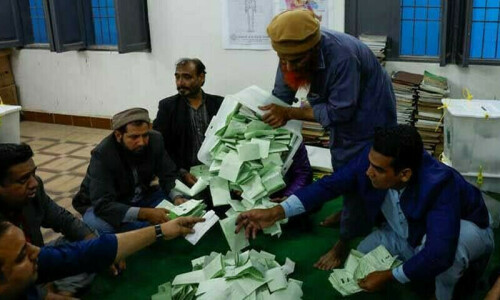
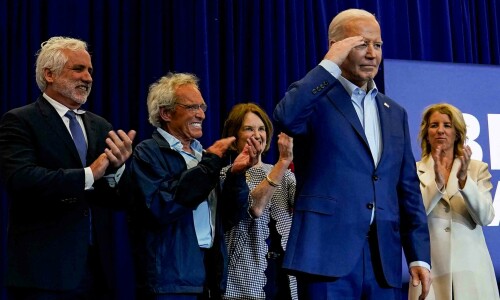








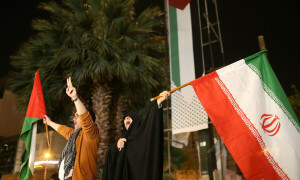
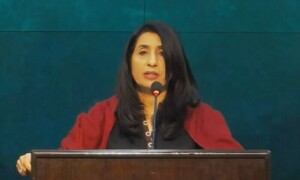


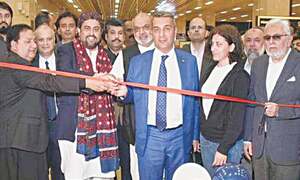


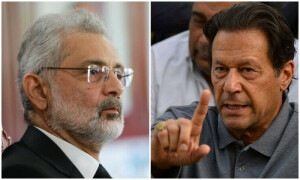









Dear visitor, the comments section is undergoing an overhaul and will return soon.